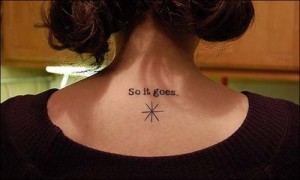You have no items in your cart. Want to get some nice things?
Go shoppingDon’t tell my mother, but I want a tattoo. No longer reserved solely for sailors, jailbirds and leather-clad bikers, tattoos have become prevalent in society over the last decade and nowadays, you’ll find them on the most surprising of people. Doctors, politicians, lawyers – I even had a maths teacher who was under instruction to always wear long sleeves in class to cover the pin-up girl on his forearm. Tattoo designs, too, have evolved from crude squiggle and today, people are inking themselves with the poetry and prose of the world’s most famous writers. Bookworms and body art enthusiasts have united and spawned the literary tattoo.
The literary tattoo: it’s a concept that excites and frustrates me. It seems like the perfect way to prove your passion and commitment to literature but is it really a good idea? And how does one go about choosing just the right stanza or sentence? With so many great works out there, how and why do people choose the phrases they do?

In my covert research for a prospective tattoo, I came across a fascinating website called Contrariwise, a page dedicated to literary ink. Before you click on the link, I warn you, it’s addictive – I spent hours browsing the archives of this website, admiring the different designs and lusting after one of my own. There’s a huge variety of artwork and authors on the site, everything from Shakespeare to J.K Rowling, although I couldn’t help but notice that certain authors and texts kept cropping up numerous times. One of these reappearing writers was Kurt Vonnegut, whose Slaughterhouse-Five and Cat’s Cradle had inspired over 30 tattoos on the website alone, with the phrase “So it goes” from Slaughterhouse-Five making 17 of that number.
So why Vonnegut? Indeed, why choose any of the authors or texts on the website? The symbolism behind tattoos varies but, undeniably, the majority of tattoo designs signify either a commitment to something or someone or have a specific personal meaning. Literary tattoos are no different. What better way to show your dedication to literature than to be marked with something literary? In the case of the great swath of J.K Rowling quotes and illustrations on the Contrariwise website, many people have used their tattoos as a way to show their passion and enthusiasm for the Harry Potter franchise. Many of the literary tattoos have deep personal meaning, as well as showing commitment to the art form. There are lots of examples of people picking beloved childhood stories, such as Where the Wild Things Are and Le Petit Prince, because it reminds them of their family and the places they’ve come from. As for Kurt Vonnegut, you could argue that “So it goes” is so popular because it resonates with people who have overcome traumas and difficulties in their lives and learnt that life just has to go on.

The combination of literature and a tattoo to some is a no-brainer. If words we have read in a story or poem stay with us, why not get a permanent reminder? People want to celebrate the authors who changed them and the books that altered their lives. We can all think of that first book or poem that really meant something to us. For me, it was reading Jane Eyre at 12 years old: it was the book that made me fall deeply and quickly in love with literature and I’ve never looked back since. Getting a passage of Charlotte Brontë placed somewhere on my body could be a positive identification of who I am and express my passion for her novels.
But when you take a sentence out of the book and place it on your skin, out of context, does it lose its meaning? I’ve always loved the poem Two in the Campagna by Robert Browning but when taken out of the poem, the last line “of finite hearts that yearn” seems to lose some of its magic. Poems are complex and the words are often deeply interconnected and have multiple layers of meaning, all of which is lost when you strip it back to one short phrase or sentence. And what if we change our minds? Favourite texts we adore in our twenties could be entirely meaningless and irrelevant to us in our forties. There’s also always the danger of choosing something purely because we feel we ought to choose it – having a passage of Ulysses on your left shoulder because James Joyce is heralded as a creative genius, full of depth and meaning, rather than because his work has any personal significance. In this case, literary tattoos seem merely pretentious.
So should we leave the words on the page or do you think literary tattoos are a perfect expression of creativity? Personally, I believe that when chosen for the right reasons, with a lot of careful consideration of the significance and meaning, literary tattoos can be beautiful.
But before you rush out and get your favourite poems inked all over the place, heed this word of warning: Contrariwise has an entire section dedicated to tattoo misspellings. I shudder at the thought of being branded with a misquoted Shakespearean sonnet, an indelible beacon of illiteracy and regret. Tattoos are forever and, with that in mind, perhaps I ought to have another rethink before I decide on getting mine. Mother, you can rest easy, I’m ink free…for now!




